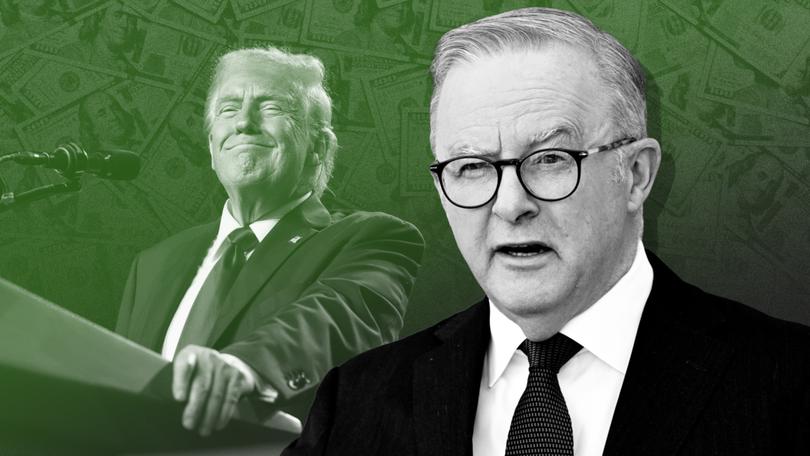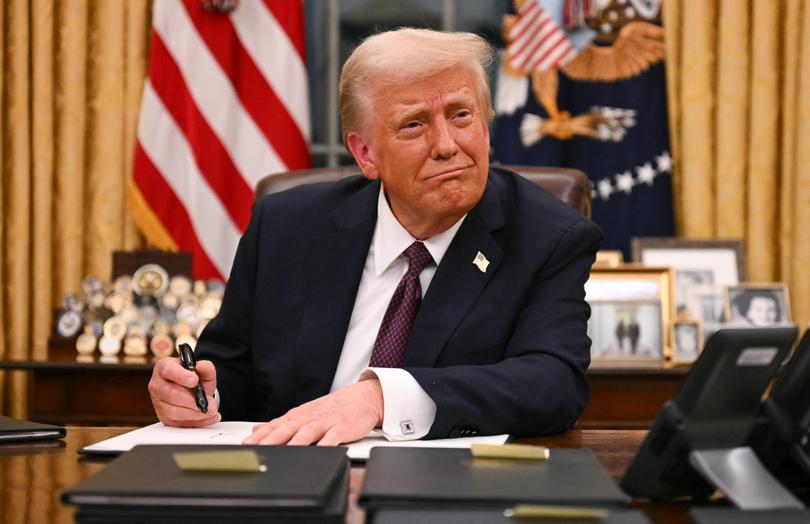In Donald Trump’s economic new world order, exceptionalism becomes the rules
With the stroke of many pens, Donald Trump has initiated a new world order that will have executives and policymakers rushing to update their playbooks. And Australia may be a big loser.

With the stroke of many pens, Donald Trump has initiated a new world order that will have executives and policymakers rushing to update their playbooks.
For Australia three key actions are most notable: pulling out of global accords, including Paris Climate, a global corporate tax deal and the World Health Organisation; rolling back environmental rules while opening the US for more energy production, and declaring tariffs are well and truly on the table.
That tariff announcement had the most immediate impact in Australia.
Sign up to The Nightly's newsletters.
Get the first look at the digital newspaper, curated daily stories and breaking headlines delivered to your inbox.
By continuing you agree to our Terms and Privacy Policy.Sitting at the Resolute Desk in the Oval Office, Mr Trump declaration that he would impose a 25 per cent tariff on both Canada and Mexico on 1 February sent markets diving.
The Australian dollar, which had risen in the inauguration ceremony fell immediately on the President’s remarks, dropping as much as 0.6 per cent. Most other currencies, led by Canada and Mexico, also fell.
The ASX200, which had risen in morning trade, plunged more than 1 per cent on the news.
Tariffs on Canada and Mexico appear to be part of wider negotiation, particularly focused on a core concern of the Trump base, immigration and crime.
Concerned about the current flow of fentanyl and migrants across its borders, the President described Canada as “a very bad abuser” of the trade relationship.
Canada has enormous two-way trade with the US and a highly symbiotic relationship with Detroit’s carmakers that sees majors like GM and Ford import around 25-30 per cent of their cars, but also affects $US97 billion ($155b) in autoparts. A tariff could boost new car prices by $US3000, driving up US inflation.
But what looked like a tariff trickle mid-signing turned into a potential flood by the end of the event.
Asked if he favoured universal tariffs across all imported goods, Mr Trump said he was “not ready for that yet”.
“You’d put a universal tariff on anybody doing business in the United States, because they’re coming in and they’re stealing our wealth.” If he did implement tariffs, the President said, they would be “rapid.”
Dr Jenny Gordon, visiting fellow at the Lowy Institute and a former chief economist at the Department of Foreign Affairs said that Australia would be a significant loser in the event of a global trade war, as a middle income country reliant on global trade flows.
By pulling out of international institutions such as the Paris Climate Agreement and the Word Health Organisation, America would be further weakening the World Trade Organisation-led rules based order, which had been fundamental to Australia’s prosperity.
“Australia and most countries in the rest of the world have really benefited from that sort of broader set of international architecture that promoted trade and investment. That’s why China boomed. And China’s booming demand for iron ore made us prosperous,” Dr Gordon said.
While Australia’s government has been confident it would not be hit with a tariff as a result of our trade deficit with the US, the Australian Chamber of Commerce and Industry was worried about any potential impact.

“Australia and the US have both benefited from a free trade agreement, and any disruption to that arrangement would obviously be bad for business in both countries,” a spokesperson said.
One of Dr Gordon’s major concerns would be a kind of bidding war between countries where bilateral trade deals required escalating concessions to get access to US markets, outside of global trade rules.
“More countries will feel they don’t have to adhere to the rules of the game. And yet honouring those rules of the game in trade, investment and the like, has been incredibly important. And for our prosperity,” she said.
Environment and energy
Energy was a key campaign focus of Mr Trump and on top of America’s exit from the Paris Climate accord, the President blocked wind farm developments, rolled back electric vehicle mandates and planned to open up more areas for oil and gas exploration.
ACCI said pulling out of the Paris Climate Agreement was “not something that’s supported by Australian business”.
“The US is the second largest source of emissions by country, and if global action is to be effective it needs all countries doing their fair share of emissions reduction.”
Estelle Parker, Co-chief executive of the Responsible Investment Association Australasia, which represents 500 members overseeing $76 trillion of assets, said Trump had also pulled out of Paris in his first term but the momentum had continued then, and will continue to do so.
“Investors know that climate change and the destruction of nature poses huge, medium-term risks to their assets and to their portfolios. They’re looking well beyond Trump’s term,” Ms Parker said.
“The World Economic Forum estimates there could be $12.5 trillion in economic losses by 2050 due to climate change, so there’s a massive physical risk that needs to be considered.”
Ms Parker also said Australia had an opportunity to benefit from a diversion of money away from US renewables investment.
“If we play our cards right, we could benefit from a reduction in new investments in things like offshore wind and onshore wind in the US, because we’ve got ample capacity for renewables in this country,” she said.
However, Mr Trump’s intention to “drill baby drill” and supercharge America’s oil and gas production was welcomed by the peak body for Australia’s fossil fuel industry.
“The expected growth in US oil and gas production reinforces the need for Australia to remove barriers to investment in new gas projects,” Australian Energy Producers Chief Executive Samantha McCulloch said.
“Australia also has an opportunity to play a critical role in our region’s energy security and decarbonisation, with LNG demand in Southeast Asia forecast to grow significantly to 2050.”
Australia’s energy companies ended mixed in markets on the day. Until there is a clearer picture of the cost base of US producers, the competitive impact on Australian firms won’t be known.
One area Australia stands to benefit may be in the electric vehicle market. President Trump repealed a 2021 order that set aggressive federal procurement targets for EV, and rolled rules on tailpipe emissions.
The Electric Vehicle Council said that would lead manufacturers to redirect supply Down Under.
“Until this year, Australia was the world’s dumping ground for high-polluting, fuel-guzzling cars,” said EV Council head of legal and policy, Aman Gaur. “We anticipate this will result in more electric vehicles, a greater variety of EVs, and more affordable prices for Australians.”

